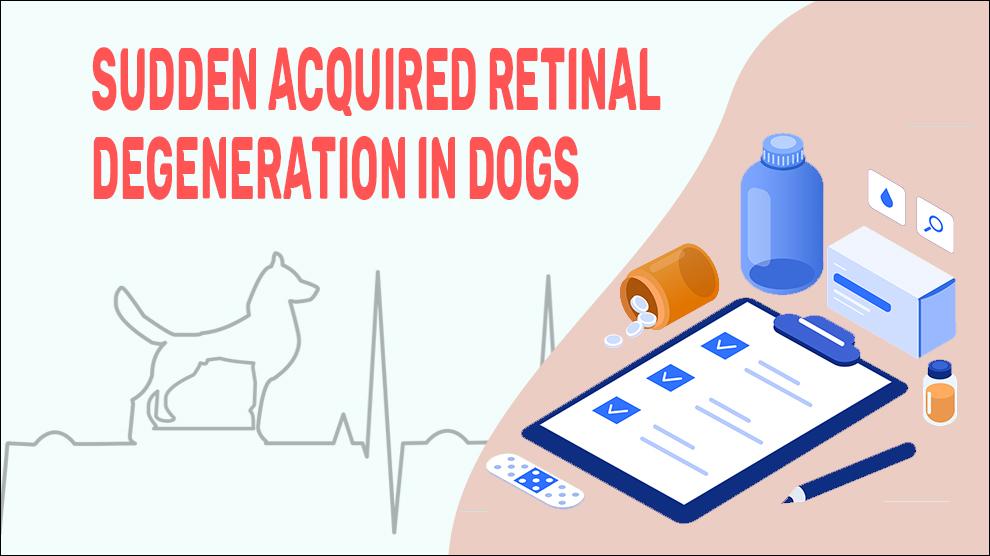What Is Sudden Acquired Retinal Degeneration In Dogs?
Sudden acquired retinal degeneration syndrome (SARDS) is a prevalent cause of sudden, incurable canine vision loss associated with non-inflammatory degeneration and apoptosis of retinal photoreceptors. This was first described in 1984 and in spite of all significant exploratory efforts over the past 4 decades, its etiopathogenesis still remains obscure.
The typical presentation is acute vision loss, with nonresponsive, dilated pupils. Primarily the fundus looks normal and insufficient abnormalities to associate with the degree of vision loss, although ophthalmoscopic signs of progressive retinal degeneration may develop over the next few months. Dogs diagnosed with SARDS often present with clinical signs of the three polys - polyuria, polydipsia, and polyphagia. The affected dogs are frequently middle-aged or older, small breed, mixed-breed, overweight, and predominantly female.
In dogs affected by SARDS, Laboratory abnormalities often include neutrophilia, lymphopenia, proteinuria, alkaline phosphatase, increased serum cholesterol, alanine aminotransferase, and aspartate aminotransferase, however, how these are related to the disease still remains elusive. Rarely this syndrome is a cause for euthanasia or enucleation and so, affected eyes are rarely available for histologic examination. There are no secondary ocular complications that have been reported and most dogs adapt well to complete or partial loss of vision.
Histologically, the lesions are bilaterally symmetric and disperse across the retina. Lesions begin as a contraction of the outer plexiform layer, develop into a standardized, scattered loss of photoreceptors, and ultimately to full-thickness disseminated retinal atrophy. After the lesion affects the photoreceptors diffusely, it is impossible to differentiate it from any other cause of photoreceptor degeneration.
Symptoms Of Sudden Acquired Retinal Degeneration In Dogs
- Bumping into objects
- Dilated pupils
- Color changes within the eye
- Reluctance to jump down from chairs
- Difficulty climbing stairs
- Unable to follow hand signals/commands
- Night blindness/Day blindness
- Decreased pupillary response to light
- Behavioral changes
Treatment Options For Sudden Acquired Retinal Degeneration In Dogs
There is no proper treatment protocol for Sudden acquired retinal degeneration syndrome
- Oral and/or Systemic Antibiotics
- Antioxidant treatment: nutriceutical supplementations delay the rate of the retinal deterioration
- Supportive and behavioral therapy
- Carotenoid supplement Lutein: This improves visual function and retinal response
- Eye Lubricant ointments
Home Remedies For Sudden Acquired Retinal Degeneration In Dogs
- Use baby shampoo to clean the eyelids: One part plain baby shampoo (no-more-tears): 10 parts warm water.
- Apply warm compresses will be comforting to the eyes.
- Chamomile tea cold compress: The flavonoids and anti-inflammatory properties of chamomile will be revitalizing sore or red eyes and relieve infections.
How To Prevent Sudden Acquired Retinal Degeneration In Dogs?
There is no way to prevent Sudden acquired retinal degeneration syndrome.
Prevention of SARDS is not possible as it is idiopathic and a hereditary concern. Genetic screening is also not available; the sensible thing to do is not to breed affected dogs.
Pet owners should be aware of symptoms associated with SARDS. Keep yourself updated about the risk factors. Always keep an eye on the symptoms and contact your vet if you notice any significant changes in their vision.
Affected Dog Breeds Of Sudden Acquired Retinal Degeneration
Australian Shepherd, Beagle, Bullmastiff, Collie, Cavalier King Charles Spaniel, Cocker Spaniel, Dachshund, Golden Retriever, Labrador Retriever, Norwegian Elkhound, Old English Mastiff, Poodle, Rottweiler, Saint Bernard, Samoyed, Springer Spaniel, Tibetan Terrier, Yorkshire Terrier, Miniature Schnauzer, Pug, Brittany Spaniel, Bichon Frise, Maltese, Young Dogs, Adult Dogs
Causes And Prognosis For Sudden Acquired Retinal Degeneration In Dogs
1. Causes:
- Retinal degeneration is an inherited condition
- Idiopathic
- Age-related
2. Mortality:
There is no documented mortality due to this condition
3. Diagnosis:
- Complete blood count (CBC)/Biochemical profile
- ERG or Electroretinogram to check the dog’s vision
- Ocular ultrasound
- Tonometry, slit lamp, and fundoscopy
- Inner eye gonioscopy
4. Prognosis:
The prognosis for dogs diagnosed with SARDS is poor as it is an idiopathic and possibly a hereditary condition. However, most dogs enjoy a comfortable life with medication and careful monitoring.
When To See A Vet For Sudden Acquired Retinal Degeneration In Dogs?
Contact your vet right away, if you notice any of the following:
- Bumping into objects
- Dilated pupils
- Color changes within the eye
- Reluctance to jump down from chairs
Food Suggestions For Sudden Acquired Retinal Degeneration In Dogs
- Sea foods such as Anchovies, salmon, Herring Whitefish, Flounder, walleye, herring, etc
- Plant/ Non-meat protein sources: Pulses, tofu, peanut butter powder, Eggs, chickpeas, green peas, broccoli, soybeans
- Leafy greens such as mustard greens, spinach, lettuce, cabbage, kale, etc
- Carotenoid foods: Papaya, sweet potatoes, pumpkin, carrots, cantaloupe, Egg yolks, spinach, and kale
- Antioxidants such as apples, Black beans (dried), Broccoli, cabbage, Blueberries, and carrots
- Zinc foods such as beef, pork, Lamb, Oysters, etc
Conclusion
The prognosis for return of vision is poor as there is no cure for SARDS. The retinal degenerated dogs will adapt and cope with their deficient vision by developing a strong sense of smell and hearing. Administer eye medications according to the vet’s instructions.

















